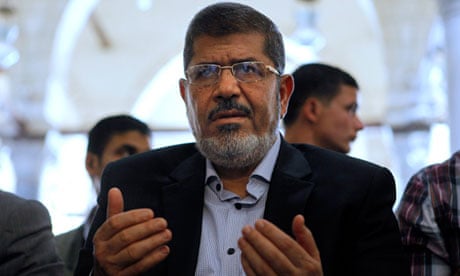Egyptian protesters detained and tried in incidents relating to the country's uprising have received a blanket pardon from the president, Mohamed Morsi, to mark his first 100 days in office.
All felony convictions or attempted crimes "committed to support the revolution and its goals" were to be pardoned, the decree stated, with the exception of murder cases.
The pardon covers the period from the onset of the revolt against the regime of Hosni Mubarak on 25 January 2011 through the army-led transitional period that ended on 30 June 2012, when Morsi assumed office.
"It's good politics. It's a way of reaching out to the secular revolutionary youth and an attempt to curry favour from a constituency that has been sceptical and critical of him and his achievements in his first 100 days in office," said Elijah Zarwan, a Cairo-based fellow at the European Council on Foreign Relations.
"He might sincerely see that the people he is pardoning did a lot to bring him to power. Without the revolution there wasn't a chance that Morsi would be president, and it wouldn't have happened without the support and participation of the Egyptian people."
The Supreme Council of the Armed Forces (Scaf) assumed power following the overthrow of Mubarak, and during the transitional period in which it ruled, 12,000 civilians were arrested, detained and convicted in military tribunals.
Critics of Morsi's pardon contend that while it is applicable to those arrested in relation to protests and clashes with security forces, it does not affect civilians arrested for non-political matters who were also subjected to military trials under Scaf rule.
Additionally, the pardon will not extend to those detained during the clashes at the US embassy in September when irate protesters breached the embassy walls after the release of a film in the US deemed offensive to Islam and the prophet Muhammad.
The ambiguous language of the decree could also make it difficult to implement, according to the human rights lawyer Tarek Abdel Aal of the Egyptian Initiative for Personal Rights, a group that has advocated on behalf of many of the detainees.
However, he said: "We should use the generalisations in the language of the decree to our advantage. The decree states that the pardon extends to all those detained in association with the revolution, and that gives us room to manoeuvre."
Morsi's pardon came the day before the one-year anniversary of the Maspero massacre, in which 27 mainly Coptic Christian protesters were killed in Cairo having been shot with live ammunition by army troops as well as being run over by military vehicles.
The Maspero massacre was a turning point in the perception of the military junta's handling of country's affairs. There is still resentment that the perpetrators of the attacks were not brought to justice, with the junta limiting the inquest to the conviction of two drivers of the armoured personnel carriers in a military tribunal. They were given three-year sentences.
To commemorate the anniversary, demonstrators marched in the footsteps of last year's protest, which had set off from the predominantly Coptic Christian neighbourhood of Shubra towards the radio and television building in Maspero, but was attacked en route.
